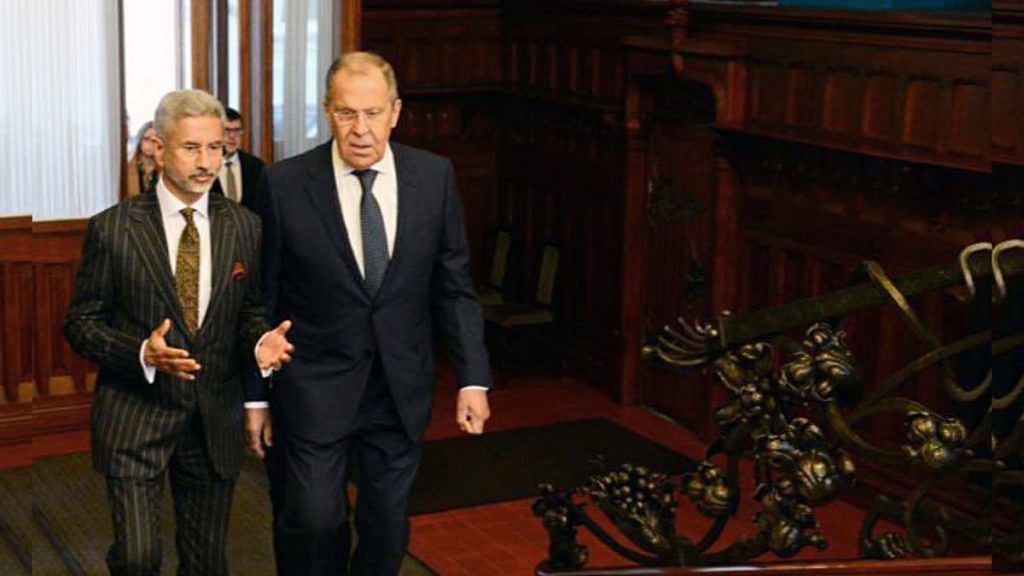Only the faint-hearted will refuse to recognise India’s strategy to deliberately diversify its foreign policy choices. Over the last 48 hours, External Affairs Minister S. Jaishankar has been in Russia; Navy Chief R. Hari Kumar has just met his counterparts from all the Quad navies — Australia, Japan and the US. Foreign Secretary Vinay Kwatra has been in the US, while India and France are conducting joint exercises in Reunion Island in the western Indian Ocean.
Especially interesting has been the conversation between Jaishankar and Russian foreign minister Sergei Lavrov in Moscow and between Kwatra and US Deputy Secretary of State Wendy Sherman in Washington DC – a new-age trilateral conversation fit for the 21st century.
The Jaishankar-Lavrov meeting triggered a caustic response from US spokesperson Ned Price. “Russia is not a reliable supplier of security assistance. Russia is far from reliable in any realm,” Price said, adding prudently that since Russian energy purchases are exempt from sanctions, India does not violate the US sanctions applied on Russia.
Certainly, Jaishankar is performing a delicate, balancing act. India cannot antagonise the Russians too much because it needs the discounted oil to grease the wheels of a troubled economy back home.
And yet, Jaishankar understands better than most that US’ patience will begin to wear thin if there’s no end in sight to India’s purchases of Russian oil – especially if Ukrainian President Volodymyr Zelensky ignores America’s warnings about “Ukrainian fatigue”.
‘Acute pain’ has to stop
Fact is, Russian President Putin has thrown the world into an unsavoury war. But he has also shown — like Stalin did during the Second World War — that Russia’s capacity to bear pain is long and enduring. So, thousands of Russians will die fighting a war they don’t fully understand in this cynical conflict. But Putin isn’t likely to stop until he achieves his goals, which he hasn’t really shared with the rest of the world so far.
Eyeball to eyeball with a country that is being supplied with American weapons to fight on, Putin will also strive to damage his enemy far more than it can damage him — look at Europe, which is hurting badly because it won’t buy Russian oil under US pressure.
It is, therefore, as much in US interest that the war ends as it is in the rest of the Global South that is suffering “acute pain”.
Also read: G20 fault lines making it hard to walk its talk. India’s presidency a chance to plug gaps
Keeping India hooked
Meanwhile, Russians will use every available weapon in the playbook to keep Delhi hooked. So, India will repeatedly be referred to a “special and privileged strategic partner” by Lavrov, while Putin himself will flatter Prime Minister Narendra Modi by describing him as a “great patriot who is able to pursue an independent foreign policy”.
Russia is also opening doors to the Taliban for India by inviting them again to participate in the Russian-led talks on Afghanistan – Delhi would certainly like to maintain its presence in a country so strongly influenced by Pakistan.
Putin must recognise that India is hugely discomfited by what he has done in Ukraine – and Modi made that clear by chastising him in Samarkand during the 2022 Shanghai Cooperation Organisation Summit – but it is assuredly not going to pull back after all these months without any real gains.
India and its diplomats recognise that too — they are holding their nose and hoping some sort of via media is found out sooner than later.
The US also recognises that it cannot afford to offend India too much – not when it needs it in the Indo-Pacific to counter China. So does India need the US and the rest of the Quad to bootstrap itself up by hopefully receiving more aid and investment than has come in so far. India also knows that when it comes to the crunch, it is the Western economies that will bail it out – not Russian companies, which are, in any case, sanctioned by the US.
That is probably why Jaishankar did not return Lavrov’s compliment of “special and privileged strategic partner” but merely described Russia as a “substantial, time-tested partnership”.
Diplomatic jargon is the life breath of every nation’s foreign policy. One may wonder about Jaishankar’s choice of words and whether they signal an ever-so-slight downgrading of the India-Russia relationship.
For the moment, it will suffice to say that India’s balancing act must be the envy of several nations. It surely doesn’t approve of Russia’s Ukraine invasion and wants it to end as quickly as possible but will keep its criticism to itself – because it needs the Russians every step of the way.
Views are personal.
(Edited by Humra Laeeq)
